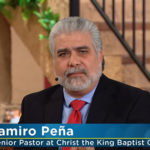COLUMBIA, S.C. (BNG)—A thousand things raced through Pastor Kevin Glenn’s mind the Sunday morning his Las Cruces, N.M., church was struck with an explosive device as worship was set to begin.
 Kevin GlennWorshippers had to be kept calm, law enforcement directions had to be followed, and the press and public had to be communicated with, Glenn told listeners on a Columbia Partnership conference call titled “Crisis and Civility in Congregations.”
Kevin GlennWorshippers had to be kept calm, law enforcement directions had to be followed, and the press and public had to be communicated with, Glenn told listeners on a Columbia Partnership conference call titled “Crisis and Civility in Congregations.”
Right at the top with those crucial actions was another—preventing members of Calvary Baptist Church from falling into a vengeful frame of mind about those responsible for the Aug. 2 attack, which also targeted nearby Catholic and Presbyterian churches.
So Glenn and his leadership team huddled to craft a simple but adamant message for church members and the public: “Calvary will extend prayer and forgiveness to the perpetrators, even while recognizing that, legally, justice must be served.”
“We want to offer help to these people” and remind the community and church that “they are not our enemy,” Glenn said.
A radical response
Glenn and others on the conference call acknowledged the Calvary response to the bombings, in which no one was hurt and arrests have yet to be made, is radical and countercultural in American society.
And that was one of the themes running through the hour-long call moderated by George Bullard and Ken Kessler of the Columbia Partnership.
 Jeffrey CollinsAlong with Glenn they hosted Greg Hunt, the author of Leading Congregations through Crisis, and Jeffrey Collins, an Associated Press writer who covered the shootings at Emanuel AME Church in Charleston, S.C.
Jeffrey CollinsAlong with Glenn they hosted Greg Hunt, the author of Leading Congregations through Crisis, and Jeffrey Collins, an Associated Press writer who covered the shootings at Emanuel AME Church in Charleston, S.C.
Sign up for our weekly edition and get all our headlines in your inbox on Thursdays
On June 17, a lone gunman walked into a Wednesday service and shot nine people to death, including the senior pastor at Emanuel AME Church. Much of the nation reacted in horror and anger.
But Collins witnessed something he considered totally amazing at a bond hearing for the suspect—family members of the slain expressing forgiveness and love for the white supremacist who had taken their loved ones.
Collins, a deacon at a Baptist church in Columbia, S.C., said he recognized the relatives’ expression as “a good Christian thing to do.” But he also saw how alien those words and sentiments were for some others in the media and society.
Because one of the purposes of the call was to provide church leaders with best practices during crises, Collins urged listeners to follow the Emanuel relatives’ examples if they ever find themselves in a similar situation.
‘A sliver of light’
By choosing and communicating forgiveness, they injected “a sliver of light” into an otherwise purely negative story, Collins said.
In addition to following Christ’s direction in the treatment of others, taking the route of forgiveness like Calvary Baptist and Emanuel AME did is a form of evangelism, Hunt said.
Exhibiting grace in that way enables Christians “to bear witness in a way that is counter-intuitive,” he said.
 Greg HuntHunt also praised Glenn and his leadership for dealing honestly and accurately with the congregation after the bombing.
Greg HuntHunt also praised Glenn and his leadership for dealing honestly and accurately with the congregation after the bombing.
It’s a topic he knows all too much about.
In 2009, when he was pastor of First Baptist Church in Shreveport, La., a bus filled with church youth suffered a blown tire and rolled several times. Many were injured and three were killed.
It happened moments before Sunday worship, leaving Hunt and other ministers with a dilemma: Should they or shouldn’t they inform the congregation—especially when so little information was available at the moment.
Hunt decided to share what he knew, and from there a practice of transparency emerged that church members appreciated, he said.
But the experience led him to start research that culminated in his book—a collection of best practices on, among other things, how to responsibly communicate with church members and the press during times of crisis.
Such actions can bring calm and clarity and avoid inaccurate stories from spreading, he said.
Hunt added it was bracing for him to discover many churches that experience such catastrophic experiences never recover.
‘It brought us together’
Similarly, Glenn noted research for a book he wrote before the August bombing at his church helped him think through Calvary Baptist’s response.
The experience of writing Hand over Fist: An Invitation to Christ-Centered Civility, Glenn said, meant “right off the bat” he was directing the staff on “how we could respond rather than react.”
They developed a communication policy that specified who from the church was authorized to speak to media and law enforcement, he said. The policy also barred speculation by never speaking about topics that were the domain of law enforcement.
“Let’s be calm, (and) let’s be clear” about how scary the experience was but also how grateful the church is there were no injuries or deaths, he said.
Glenn acknowledged it was a strange way to begin his pastorate at Calvary Baptist. The bombing occurred on his first day as pastor.
“It’s not the way I would have written the script, but it brought us together very quickly,” he said.














We seek to connect God’s story and God’s people around the world. To learn more about God’s story, click here.
Send comments and feedback to Eric Black, our editor. For comments to be published, please specify “letter to the editor.” Maximum length for publication is 300 words.